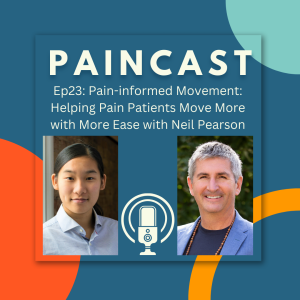
Monday Feb 05, 2024
Ep23: Pain-Informed Movement: Helping Pain Patients Move More with More Ease with Neil Pearson
Neil Pearson is a physical therapist, yoga therapist, author, researcher, Clinical Associate Professor at the University of British Columbia, faculty in three IAYT-accredited yoga therapy programs, board member for International Association of Yoga Therapists and pain care advocate. He is the founding chair of the Canadian Physiotherapy Association’s Pain Science Division, and the recipient of awards honouring his work in pain care, patient education and physiotherapy by Queen’s University, the Canadian Pain Society, and Physiotherapy Associations of BC and Canada, including the Canadian 2021 Medal of Distinction. Neil is involved in research studying the effects of yoga and pain-informed movement practices on people with knee osteoarthritis, and has written numerous peer-reviewed papers on yoga, yoga therapy and pain, including a white paper describing the position of yoga therapy within comprehensive integrated pain management. He is a consultant to Partners in Canadian Veterans Rehabilitation Services, and to Lifemark’s 300+ clinics in Canada. Neil is a past board member for Pain BC, Canada’s premier non-profit transforming the way pain is understood and treated. He co-authored – Yoga and Science in Pain Care 2019, authored the patient education ebook, Understand Pain Live Well Again in 2008, and is lead contributor to many free patient resources offered by Pain BC. Neil provides physiotherapy and yoga therapy to veterans at the Broken Squirrel Clinic in Courtenay, BC.
In this episode, we talked about what pain-informed movement is, its underlying cognitive and neurophysiological mechanisms to help chronic patients move more with more ease, and practical considerations on implementing pain-informed movement. Enjoy!
Relevant resources:
- www.paincareaware.com
- https://lifeisnow.ca/
- Blickenstaff, C., & Pearson, N. (2016). Reconciling movement and exercise with pain neuroscience education: A case for consistent education. Physiotherapy Theory and Practice, 32(5), 396-407.
- Nijs, J., & Meeus, M. (2016). Five requirements for effective pain neuroscience education in physiotherapy practice. https://paininmotion.be/blog/detail/five-requirements-effective-pain-neuroscience-education-physiotherapy-practice
- Modarresi, S., et al. (2023). Pain Informed Movement for people with knee osteoarthritis: Protocol for a pilot randomized controlled trial. Osteoarthritis and Cartilage Open, 5(4), 100402.
Paincast is dedicated to bringing together researchers, clinicians, and students to discuss topics related to pain and physiotherapy. The primary purpose is to facilitate knowledge translation and critical thinking. Some episodes posit themselves as more educational than others, and some more opinionated than others. The listener is encouraged to listen critically. While there is an effort to incorporate research evidence, and the topics are always researched by the host, we recognize there is room for improvement and there is expertise in the community. As such, we invite constructive critique and that you inform us of any inadvertent errors, so that we may correct them. You may submit your feedback through this form: https://forms.gle/UFfbUHBh8uKwSKgS8
No comments yet. Be the first to say something!